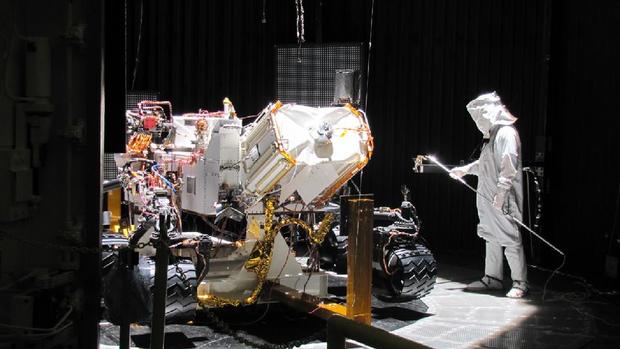Stakes as high as risks for NASA with Curiosity
(CBS News) NASA is gearing up for what's being called "7 minutes of terror."
That's how long it will take for the Mars rover Curiosity to get from space to the surface of Mars, early Monday morning.
It's one of the most complicated landings ever attempted.
After traveling more than 350 million miles from Earth, Curiosity will hit the Martian atmosphere traveling at 13,000 miles per hour.
If all goes as planned, a heat shield will protect it, and a giant parachute will help slow it down.
Then, rockets will kick in, getting the rover to within 20 feet of the surface, when what's called a "sky crane" will gently lower it to the surface.
"7 minutes of terror" for Mars mission
Mars rover: from 13,000 mph to soft landing, with NASA's future in the balance
Five myths about Mars
It all has to work perfectly, and that's why everyone at NASA is concerned about the risks.
Dr. Paul Doherty, senior scientist at the Exploratorium in San Francisco, explains that, "The atmosphere of Mars is thick enough to heat your spacecraft and melt it on the way in if you don't slow down in the right way, but it's thin enough that it's hard to slow down. So it's this delicate balance between slowing down fast enough and not slowing down at all. And that's [why there's a need for] this incredibly complicated heat shield parachute rocket sky crane maneuver."
Doherty says Curiosity is particularly important to NASA due to its sheer size.
"It's the size of a smart car in terms of weight," he told "CBS This Morning: Saturday" co-host Terrell Brown. "It's one ton on Earth, with 165 pounds - about a person's worth - of science instruments. And the last missions were much smaller. They had, like, 20 pounds of science instruments for the rovers that we know so well."
Doherty says NASA hopes Curiosity will help its quest to answer "one of the most important questions that humanity has ever asked. And that is, is there life on other worlds? And this is just one step in NASA's well-planned procedures to find out if there's been life on other worlds. This one is looking for the habitat for life on Mars. Could life exist there now, or has it ever existed there?"
To see the entire interview, click on the video in the player above.
